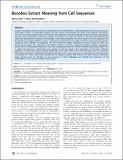Bonobos extract meaning from call sequences
Abstract
Studies on language-trained bonobos have revealed their remarkable abilities in representational and communication tasks. Surprisingly, however, corresponding research into their natural communication has largely been neglected. We address this issue with a first playback study on the natural vocal behaviour of bonobos. Bonobos produce five acoustically distinct call types when finding food, which they regularly mix together into longer call sequences. We found that individual call types were relatively poor indicators of food quality, while context specificity was much greater at the call sequence level. We therefore investigated whether receivers could extract meaning about the quality of food encountered by the caller by integrating across different call sequences. We first trained four captive individuals to find two types of foods, kiwi (preferred) and apples (less preferred) at two different locations. We then conducted naturalistic playback experiments during which we broadcasted sequences of four calls, originally produced by a familiar individual responding to either kiwi or apples. All sequences contained the same number of calls but varied in the composition of call types. Following playbacks, we found that subjects devoted significantly more search effort to the field indicated by the call sequence. Rather than attending to individual calls, bonobos attended to the entire sequences to make inferences about the food encountered by a caller. These results provide the first empirical evidence that bonobos are able to extract information about external events by attending to vocal sequences of other individuals and highlight the importance of call combinations in their natural communication system.
Citation
Clay , Z & Zuberbuehler , K 2011 , ' Bonobos extract meaning from call sequences ' , PLoS ONE , vol. 6 , no. 4 , e18786 . https://doi.org/10.1371/journal.pone.0018786
Publication
PLoS ONE
Status
Peer reviewed
ISSN
1932-6203Type
Journal article
Description
This research was funded by a Leverhulme Trust Research Leadership Award and the Wissenschaftskolleg zu Berlin. The funders had no role in study design, data collection and analysis, decision to publish, or preparation of the manuscript.Collections
Items in the St Andrews Research Repository are protected by copyright, with all rights reserved, unless otherwise indicated.

